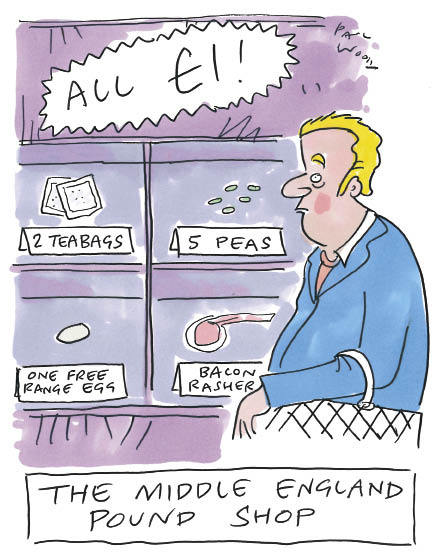In spite of the hype, I enjoy the World Cup. But I don’t enjoy the omnipresent James Corden, who played the clingy, footie-loving, curry-scoffing, lager-glugging, belly-baring, deeply annoying best friend in Gavin and Stacey.
In spite of the hype, I enjoy the World Cup. But I don’t enjoy the omnipresent James Corden, who played the clingy, footie-loving, curry-scoffing, lager-glugging, belly-baring, deeply annoying best friend in Gavin and Stacey. That was funny. Bringing the same persona into his World Cup Live programmes (ITV, too often) is just embarrassing. Corden is from that school of comedians who think that laughing a lot is, in itself, funny. He’s like that table full of drunks in a restaurant who imagine you share their hilarity, when actually you loathe them. He is a human vuvuzela, making a loud and meaningless noise, because he can.
His first show, after the England v. USA match, included, for no apparent reason, Simon Cowell, who may feel that he doesn’t get enough exposure on television already. Cowell spent most of a grim half-hour looking in need of a red button to press in order to get rid of everyone else. And there was Katy Perry, who is an American pop singer. Her fiancé, Russell Brand, is apparently a West Ham fan. So?
Worst of all, even though the programme began just 20 minutes after the match ended, it in no way reflected the national mood of mingled pity and resentment we all felt for Robert Green, the wretched England goalkeeper. It felt packaged and preplanned. They couldn’t have changed it if England had just won 6–0 or been humiliatingly defeated.
Presumably ITV felt that by signing a footie-loving, curry-scoffing, etc., fattie they would appeal to the average fan. But these are exactly the bucket-of-vindaloo people the average fan despises, especially at World Cup time, when millions of people who couldn’t care less about football for three years and 11 months are drawn into the fun and spectacle. And what do they get? James Corden. Aargh!
Frost on Satire (BBC4, Thursday) had intriguing interviews with satirists such as Ian Hislop, Rory Bremner, John Lloyd of Spitting Image, Tina Fey and Jon Stewart from The Daily Show, which is a consistently funny take on the day’s American news — a far broader canvas than we can offer on our small island. There was a lot of interesting material; it was good to be reminded of the way Tina Fey didn’t just do an impression of Sarah Palin but also became Sarah Palin in a way that the Republican candidate for vice-president could never quite manage herself. People grow to look like their caricatures because the cartoonists and impressionists pick on small elements of their faces or speech, and so bring them to our attention. Thus Bremner’s John Major (‘I’m still here!’) is more convincing than John Major.
But one thing was curiously ignored — the way that the balance of power has shifted. It’s a commonplace that the golden age of satire was in 1930s Berlin and that it did exactly nothing to stop the rise of Hitler. But those satirists were impoverished students, living in cold, dirty, Christopher Isherwood flats, operating in small night clubs, half-expecting every night the arrival of armed Nazis. Now satirists are paid vastly more than the people they satirise, none of whom would ever dare to challenge them — who even co-operate with their tormentors by going on Have I Got News to be insulted to their faces. In the past, satirists hoped perhaps to seize or at least influence power. Nowadays mere politicians would love to become satirists, because that’s where to find the money, the fame and the influence. Even Lembit Opik, defeated at the general election, is now trying to earn a crust doing stand-up. Not very well, we’re told — the problem is that it takes real talent to be a comedian, whereas literally anyone can become an MP.
Gareth Malone Goes to Glyndbourne (BBC2, Thursday) is yet another show in which a bunch of kids, usually no-hopers from sink estates, are whipped into joining something way outside their known world. In this case they are to provide the chorus for Knight Crew, a modern opera based, roughly, on the Camelot myth. There are the usual shots of sullen teenagers expressing dislike and distrust, followed by these same young persons discovering the heady joys of musical performance and personal fulfilment. One would be slightly more convinced if Gareth wasn’t preceded into every school playground or youth club by a camera crew offering the beguiling chance of appearing on television.
It’s hard to know where the BBC can go next with this formula. I have an idea for them: why not send James Corden to Rada where he can persuade them to abandon a life of focused hard work and learn the satisfaction of slacking, lager-swilling, curry-munching, footie-following and laughing raucously at things that aren’t funny?





Comments